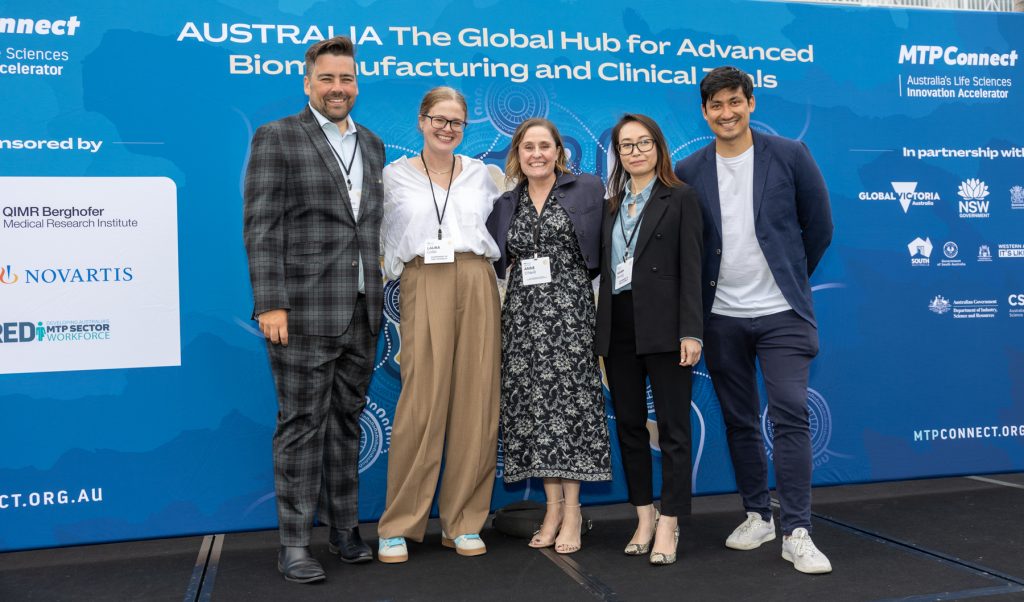NSW Health creates a buzz at BIO 2024
As winter was chilling our mornings in June, Australian delegates were packing for warmer climes to attend the BIO 2024 International Convention in San Diego. The NSW Health Office for Health and Medical Research was represented by Anne O’Neill, Director of Enterprise, International Partnerships and Clinical Trials, who has over 25 years’ extensive experience in health, medical research and policy, and Dr Laura Collie, Senior Medical Advisor and Public Health Physician, who established the Advanced Therapeutics team within NSW Health to support the development and delivery of next generation technologies into the health system.
During BIO 2024 our NSW Health delegates showcased our world-leading biomanufacturing and clinical trials capabilities, including advanced therapeutics such as viral vectors and phage therapy in meetings, presentations, networking events and discussions at the Australia team exhibition stand.

What is BIO?
The BIO International Convention is the world’s largest biotechnology conference. Industry leaders attend from the entire biotech ecosystem, including biotech startups, academic institutions, hospitals and government departments, not for profit companies and public pharmaceutical companies. Updates and critical insights from global thought leaders address major topics at the intersection of science, business and policy. The biggest delegations attend from South Korea, Canada, the UK, Japan, Germany, France, China, Australia, Taiwan and Switzerland. This year BIO featured more than 100 interactive sessions across four days covering healthcare innovations, policy, processes, regulations and considerations related to digital health, patient advocacy and next-generation biotherapeutics. Over 19,000 delegates attended. Global innovation hubs and professional development courses were also on offer and experts provided updates on infectious diseases and vaccines.
The annual NSW Breakfast Event
It was standing room only at the NSW breakfast on the first morning of BIO 2024, which was the major event run by NSW Health. The showcase was introduced and chaired by Anne O’Neill, with an overview of NSW strengths and capabilities provided by Dr Laurie Collie. Prior to an engaging panel discussion, short presentations were also given by Dr Kate Michie, Chief Scientist, Structural Biology Facility, University of New South Wales, Dr Julio Ribeiro, Founder and Executive Officer from Australian MedTech company Inventia Life Science and Associate Professor Anai Gonzalez-Cordero, Group Leader, Stem Cell Medicine and Head, Stem Cell and Organoid Facility at the Children’s Medical Research Institute.
“This year we focused on non-animal testing models in clinical research,” says O’Neill. “We promoted NSW’s current and future-focused work on providing evidence and data to show that these are reliable models that are not only sustainable but are transformative. We also highlighted how non-animal models can create efficiencies and in some cases provide better clinical data about human impacts. They can also dramatically reduce costs – for example, using organoids or bio-printing models that can be tested.”
The topic of the breakfast showcase was timely given recent indicators that the US Food and Drug Administration and regulators in Europe are moving towards the adoption of more non-animal testing models for clinical trials. “Attendees at the breakfast event were very keen to hear from our three key opinion leaders about what we were doing in this area and how we are progressing the use of non-animal testing models in NSW,” says Senior Medical Advisor, Dr Laura Collie. “After the breakfast, we received a great deal of feedback from delegates who expressed that our presentations and panel provided a great overview of the why and how in relation to non-animal testing models. They wanted to know more about the valid options for replacing animal testing and the frameworks we are embedding to support that shift as NSW Health ensures NSW keeps apace with that change.”
The popular breakfast event was not only well attended but most delegates stayed for the duration, to ask follow-up questions of the panel and to network. “They were engaged and asking important questions, such as how to enlist support for these non-animal testing models with the drivers of change such as multinational big pharma,” says O’Neill. “Using non-animal testing models also aligns with animal welfare considerations and the rise in ethical investment, which was a recurrent topic at BIO and one NSW Health is addressing, given that Australia’s superannuation assets are the 4th biggest in the world.”
NSW Health conference drawcards
At BIO 2024, the work of NSW Government in advanced manufacturing in relation to viral vectors, RNA and phage attracted much attention. The strong Australian clinical trials sector also proved a big drawcard. “The Commonwealth R&D tax incentive is clearly encouraging more investors to consider NSW as an optimal environment in which to conduct clinical trials,” O’Neill points out. “The feedback was that our approach is extremely well regarded because we complete clinical trials of high-quality and the NSW early phase clinical trials framework enables approvals within 20 days. Our presence at BIO built further on this strong reputation and clinicaltrialsNSW supports industry and other organisations to navigate the system, providing access to key opinion leaders, sites and cohorts and experts who can assist with our ethics and governance processes. As a result of these connections, investors are now in touch with us to explore clinical trial partnerships.” The work of Cancer Institute NSW and our world-leading precision medicine programs (Omico, ProCan, and ZERO Childhood Cancer) also generated interest.
Building key new partnerships
Via the BIO One-On-One Partnering match-making platform, NSW delegates were invited to meet with many international delegates and C-suite representatives who wanted to know more about NSW capabilities and assets. NSW delegates also attended fire-side chats and round table discussions covering topics ranging from workforce skills to MTP (Medical Technologies and Pharmaceuticals). “New key connections with interested parties, including one relationship which will be fostered to help support women in STEM, are now being followed up and consolidated,” says O’Neill.
Updated 9 months ago